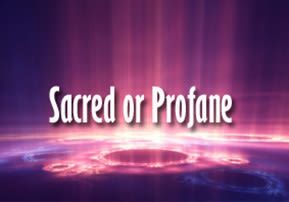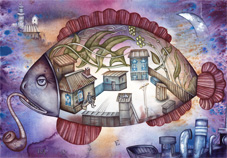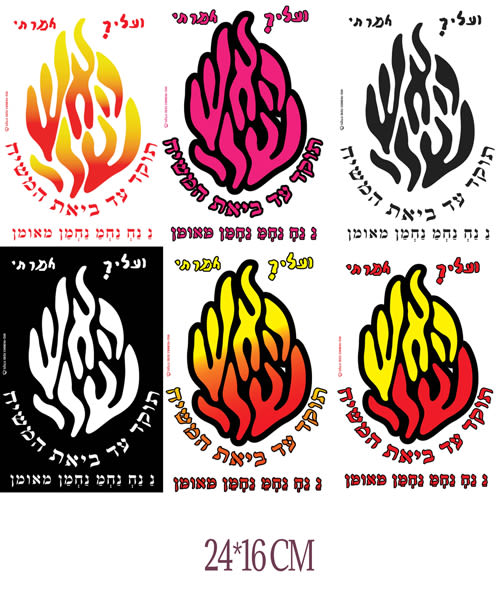
Shmini: Sacred or Profane
In Jewish spirituality, something is pure or impure, kosher or not kosher, sacred or profane. There is no middle ground between the two and no hybrids...

"To differentiate between the sacred and the profane…"(Leviticus10:10).
Rashi explains that the above passage implores a person to distinguish between the type of Divine service that is sacred and that which has lost its sanctity, therefore becoming profane.
Earlier (ibid, 8), the Torah warned the Cohanim not to drink wine or any other intoxicating beverage before entering the Tent of Meeting to perform their sacred tasks in the holy Tabernacle. The rationale behind the prohibition of drinking intoxicating beverages is that Hashem wants the Cohanim, the priestly tribe charged with the task of Divine service in the House of Hashem, to perform their duties in complete holiness. The Zohar not only equates joy with holiness, but says that joy is the most reliable indication of holiness. The Gemara adds that the Divine Presence dwells only in a place of joy.
A Cohen who serves in holiness is one who performs his sacred task with gladness of the heart. In other words, his joy should come from the heart, for this is called "sacred". But, when the joy comes from any  outside agent, such as an intoxicating beverage or any other external substance, it is no longer genuine joy. Indeed, since it is no longer joy, the externally-induced "high" is profane and therefore prohibited in Divine service.
outside agent, such as an intoxicating beverage or any other external substance, it is no longer genuine joy. Indeed, since it is no longer joy, the externally-induced "high" is profane and therefore prohibited in Divine service.
Although there are limitless levels of holiness, and equivalent levels of the opposite, nothing can be sacred or profane simultaneously. In Judaism, something is pure or impure, kosher or not kosher, sacred or profane. There is no middle ground between the two and no hybrids. With this in mind, one can certainly not attain holiness by way of profanity. They are mutually exclusive. A person's first steps in Divine service might be entry-level holiness, but they're still rungs on the ladder of holiness that can lead to much higher holiness. The opposite is also true. One can maintain that looking at a woman other than his wife does not constitute adultery, but it's nonetheless entrance-level profanity that is liable to lead to much worse things.
Some people enable the evil inclination to fool them into thinking that external substances such as alcohol, tobacco and drugs will calm them and give them a good feeling. I have even heard Torah students claim that cigarettes or marijuana help them learn and absorb the Gemara. Such types of claims show us just how blatant the evil inclination's lies are. The Torah is the "Tree of Life," for it gives life to those who cling to it, both in this world and in the next world. Can one possibly be so gullible to believe that a substance that destroys his lungs, heart and other vital organs be conducive to attaining the life-giving Torah? The opposite is true. My esteemed and beloved teacher and spiritual guide Rabbi Shalom Arush shlit'a has often said that any Torah learned under the influence of external substance goes directly to the Sitra Achra, the dark side.
Hashem commands us to be a nation of "Cohanim" (Exodus 19:6), which means that we should all serve Him in a priestly manner. Today, our Divine service doesn't entail ritual sacrifices until such time as the Holy Temple in Jerusalem will be rebuilt, speedily and in our days, amen. Our prayers are our Divine service, for the words of our lips that come from a pure heart take the place of ritual sacrifices today. Hashem wants us to pray, as well as perform all of our other mitzvoth, with the same joy of heart that He requires of the Cohanim, the priestly tribe serving in the Holy Temple. This is joy from within, not externally induced.
How does one attain joy from within, especially in a world with so many challenges, every day and virtually every hour of our lives? There's only one way – emuna.
The very first principle of Emuna, our pure, complete and unconditional faith in Hashem, is that He alone did, does and will do every single deed (Rambam, Thirteen Principles). Hashem loves every one of us and does what's best for us. So, since He is behind everything, then there is no bad in the world for everything He does in our lives is the product of His unfathomable love, whether or not we understand. Consequently, the more we strengthen ourselves in emuna, the more we attain inner peace and genuine heartfelt joy. This is the joy that enables us to sanctify ourselves and transform the profane into a most sacred entity.











Tell us what you think!
Thank you for your comment!
It will be published after approval by the Editor.